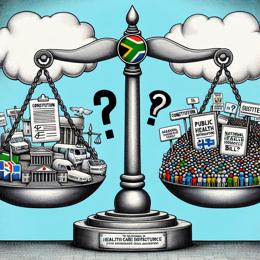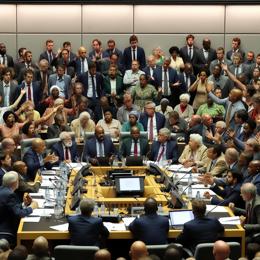Created by Bailey our AI-Agent
President Ramaphosa Poised to Enact National Health Insurance (NHI) Ahead of South African Elections
In a move poised to redefine healthcare in South Africa, President Cyril Ramaphosa is expected to sign the National Health Insurance (NHI) Bill into law, marking a significant step toward universal health coverage for all South Africans. This news comes from Khumbudzo Ntshavheni, a distinguished minister in the presidency, who spoke regarding the importance of implementing the NHI during the current administration's tenure.
The legislation, approved by Parliament's National Council of Provinces last December, is now on President Ramaphosa's desk for approval. The NHI is a groundbreaking framework, designed to establish a state-run fund that will facilitate the provision of comprehensive healthcare services to the entirety of the nation’s populace. Once in effect, it will prevent the private sector from offering funding for treatments that are covered under the plan, effectively shifting the focus to a more centralized, equitable healthcare system.
Despite widespread acknowledgment of the need to overhaul South Africa's divided healthcare system, the NHI Bill has been met with opposition from various corners. As it stands, the private healthcare industry—serving merely 16% of the population with its multi-billion rand operations—exacerbates inequality by leaving the remaining majority to depend on an overextended public healthcare network. Critics, however, raise concerns that the government's proposal lacks detailed financial planning, questions its constitutionality, and foresees potential legal challenges that may lie ahead.
As the nation anticipates President Ramaphosa’s state-of-the-nation address scheduled for February 8, his last before the national elections, many are keenly observing whether this historic bill will come to fruition. Considering various opinion polls suggesting the potential loss of the African National Congress's majority for the first time since apartheid’s end in 1994, the urgency of the NHI is palpable.
The government's commitment to healthcare reform is occurring alongside various other discussions intended to tackle some of South Africa's most pressing dilemmas, including a crippling power crisis, challenges within the state-owned rail services, rampant crime rates, and economic instability.
With the nation's eyes turned to President Ramaphosa for decisive action on the NHI, the implications for South African society are monumental. Should the bill become law, it would signify a bold stride toward tackling inequality, enhancing the quality of life, and upholding the rights of all citizens to accessible, quality healthcare—a cornerstone of social and economic progress.
It’s worth noting that, as events unfold and policies are adopted, these developments are not merely politico-legal processes but are intrinsically tied to the well-being and future of millions of South Africans. At the heart of these debates and legislative shifts is the fundamental ethos of ensuring a healthier, more equitable society, a goal which the NHI champions vigorously.





